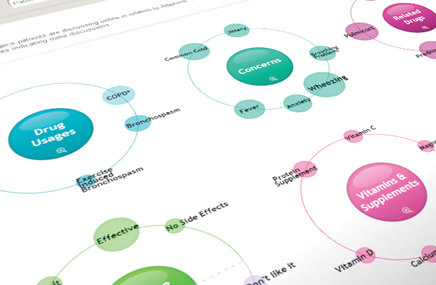IG Analytics“When it comes to gaining insight, the first place to start is with a social conversation audit. ”
Shwen Gwee, VP, digital health, Edelman
When Peter Frishauf founded Medscape in the mid-1990s, few pharma companies had a website. “Even those that liked the idea and wanted to support us had nowhere to bring it back to,” he says.
Understandably, there were many doubters. “We were at Abbott, just after the antibiotic Biaxin launched,” Frishauf recalls, “and the brand team had been told by Abbott executives: ‘Be wary of the web, it’s a dangerous, scary place.’” So Frishauf suggested a web search. The message that appeared most frequently among the results was that “Biaxin makes your stomach queasy and you will eat less,” which was “the last thing that Abbott wanted to see and hear.”
Frishauf’s early demonstration of the risks of not embracing the digital realm is valid today. But tomorrow’s big story will not be about how we connect with and find data. It will be about our ability to decipher data, and provide actionable insight therein.
“When it comes to gaining insight, the first place to start is with a social conversation audit,” says Shwen Gwee, VP, digital health, Edelman. “The more famous ones are Salesforces’ Radian6 and other conversation tools. In the past, it was more syndicated and traditional research—now it’s just a lot easier to do it yourself.” And the do-it-yourself route is a popular one—companies like Treato and Salesforces’ Radian6 can offer drugmakers a snapshot of their brand’s presence online or who the patient opinion leaders are in a given disease space.
“Everyone right now is trying to listen to try and figure out the sentiment, what people are saying about a drug, and who the influencers are and who’s got the most likes,” says Yaron Landow, VP, US Sales and Business Development for Treato. “Treato Pharma helps organize discussion data so they can see what patients are really talking about when it comes to their experiences.”
With data from 23 million patients, and over a billion posts which are talking about over 11,000 different medications, this is what we mean when say Big Data. While Treato analyzes healthcare blogs, posts and bulletin boards—then Symplur is its Twitter, West Coast complement.
California-based Symplur has a special agreement with Twitter that allows them access to millions upon millions of tweets regarding healthcare topics.
“We have what Twitter calls elevated API privileges, which allows us to track conversations on certain topics,” explains Audun Utengen, partner at Symplur, “we’re listening for keywords, and when they’re mentioned, we basically are given that whole tweet and meta data by Twitter. We can then link this with other databases like U.S. doctors’ Twitter accounts, and so see what they’re saying and who they’re talking to. For example, last month, what did all the pulmonologists tweet about—what they did they mention most frequently—we can answer those questions.”
From the February 01, 2013 Issue of MM+M - Medical Marketing and Media








